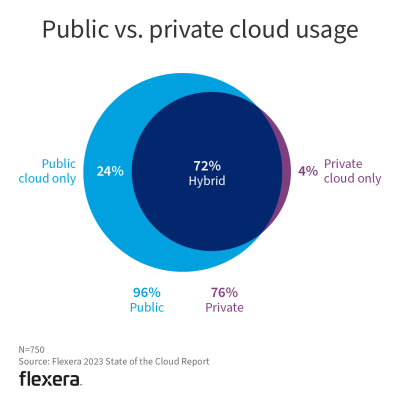-
SoftIron is introducing HyperCloud 2.0, which its COO claims is a "true private cloud"
-
The COO told us the product can connect to multiple instances of the public cloud, including Amazon Web Services, Google Cloud and Microsoft Azure
-
The company said that it can be an alternative to VMware for some
SoftIron told Silverlinings that it is offering the "first true private cloud" which connects to multiple major public cloud offerings.
The company has developed a full software and hardware stack to achieve this feat and now it's launching the next major version of the product.
“We believe the IT industry has somewhat lost it’s way, building genericized hardware out of other people’s factories, putting other people’s labels on the front, and then just layering stacks of proprietary software on top of that to get a result,” SoftIron’s COO Jason Van der Schyff told Silverlinings on a call.
Specifically, the COO claimed that SoftIron's true private cloud connects to multiple instances of the public cloud. This includes Amazon Web Services, Google Cloud and Microsoft Azure. He notes that each of these public clouds now offers a limited connection to on-prem private clouds but “require some kind of tether to the cloud mothership” while also coming up with “consumption models for on-premises workloads."
So clearly costs could rise if you use the public cloud for on-prem workloads.
Van der Schyff told us that while many enterprises see the value of the public cloud, most companies are still using private iterations. “Everyone talks about the public cloud but the reality is that 76% of enterprises are still using the private cloud,” Van der Schyff said, citing a recent Flexera cloud report (see below).

Getting hyped about cloud
The startup launched HyperCloud 2.0 last week, expanding the lines of compute, storage and interconnect nodes offered by the private cloud product. “At a bare minimum you require 3 storage nodes, 2 compute nodes, and 3 interconnect nodes, but then beyond that you can scale them independently,” the CEO said.
Interesting, for sure, but what about the claim of being first? We asked Gartner's Tony Hawley, senior director and analyst of infrastructure and operations.
“I take any claims of being the first one true anything as marketing hyperbole,” said Hawley in an email. “[But] SoftIron does have some unique capabilities in that they design and develop the full stack of both hardware and software. In the event of any issue or security vulnerability they can fix it themselves without having to rely on any other vendor to release patches, deliver an update or go through their qualification testing.”
This will suit an enterprise that is looking for a turnkey system from a single vendor with a single point of support for the entire stack, Hawley said.
SoftIron’s COO said that a tier one bank in the UK is one of the company’s customers, as well as the United States Air Force and e-commerce firm THG.
Like many others, SoftIron is currently touting itself as a replacement for VMware.
“The thing that any enterprise would need to think about for SoftIron would be what about the full ecosystem that surrounds VMware — if you already have a backup, DR, security and vulnerability scanning, capacity planning solutions that are tied to VMware,” Gartner’s Hawley wrote.
“What elements of those would need to be replaced or just changed to switch. If this was a new private cloud infrastructure, then it could be a viable alternative," he added.
SoftIron was founded in 2012 out of the United Kingdom. Most of the executive arm, however, is now based in the U.S. The startup has raised “about $60 million via equity” so far, according to the COO, with the last funding round coming in 2020.
